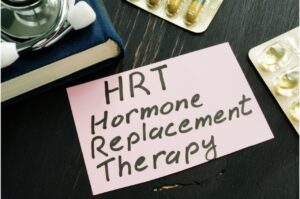
Just started hormone replacement therapy (HRT) and wondering when you’ll finally feel a difference? It’s a common and understandable question, especially when you’re dealing with stubborn fatigue, brain fog, mood swings, weight gain, or low libido. You’re ready for relief, but unsure when it will come.
So you ask, how long does it take for HRT to work? The truth is, it works gradually, not overnight. With the right expectations and consistent care, many people notice improvements within a few weeks.
This blog breaks down what symptoms may improve first, how the process typically unfolds, and what to expect on your journey so that you can move forward with clarity and confidence.
 Patients often ask, “How long does it take for HRT to work?“ Clinically, most individuals begin to experience early improvements such as enhanced sleep quality, mood stability, or increased energy, within 2 to 6 weeks, depending on their baseline hormone levels and overall health status
Patients often ask, “How long does it take for HRT to work?“ Clinically, most individuals begin to experience early improvements such as enhanced sleep quality, mood stability, or increased energy, within 2 to 6 weeks, depending on their baseline hormone levels and overall health status
It is essential to understand that hormone therapy works by gradually restoring hormonal balance and addressing underlying hormone imbalance, which takes time. Unlike quick fixes or symptom-masking solutions, HRT supports the body’s natural processes, resulting in progressive and measurable changes.
In many cases, the full benefits of HRT appear over 3 to 6 months. These may include improved mental clarity, enhanced libido, easier weight regulation, and more consistent energy, especially when the treatment is monitored and adjusted through ongoing medical oversight.
Understanding the HRT results timeline can help set realistic expectations and reduce anxiety when starting hormone therapy. While individual responses vary, most people experience a gradual pattern of improvement over the first few weeks and months.
During this period, your healthcare provider should monitor your progress regularly, adjusting treatment as needed to ensure safety, effectiveness, and optimal symptom relief.
Several factors can impact HRT effectiveness, influencing how quickly and well you respond to treatment. Knowing these variables helps you and your provider make informed decisions and optimize your treatment over time.
The kind of hormone therapy, bioidentical or synthetic, can affect how your body responds. Bioidentical hormones closely mimic your body’s natural hormones and may lead to fewer side effects or better symptom control.

When taking HRT, the delivery method—whether through injections, pills, patches, creams, or pellets—affects how your body absorbs and responds to hormones. Each option delivers hormones at a different rate, impacting symptom relief and overall hormone stability.
Your age, stress levels, sleep quality, activity level, and overall medical history all affect how your body processes hormones. Chronic inflammation, nutritional deficiencies, or underlying conditions can slow your progress and impact your treatment response.
Sticking to your prescribed treatment plan and completing follow-up lab testing is essential for long-term success. Inconsistent use or missed appointments can delay results and make it harder to adjust your therapy effectively.
These factors highlight why no two HRT experiences are exactly alike. Personalized care leads to better outcomes, helping you experience the full range of hormone therapy benefits safely and effectively.
If you’re experiencing symptoms and have started hormone therapy, it’s essential to know when to check in with your provider. Here are a few signs that may signal the need for adjustments:
These situations don’t mean HRT isn’t working—they tell you that your plan may need fine-tuning. With expert support, adjustments are a normal and valuable part of achieving long-term success with hormone therapy.

Edge Weight Loss & Fatigue is here to guide you through every step of your HRT journey. From your first consultation to long-term follow-ups, we aim to help you feel balanced, supported, and well-informed.
So, how long does it take for HRT to work? The answer varies, but meaningful changes often begin within weeks and build over a few months. The key is patience, support, and trust in the process.
You don’t have to guess or wait alone. If you’re ready to start your hormone therapy journey with expert guidance, Edge Weight Loss & Fatigue is here for you, every step.